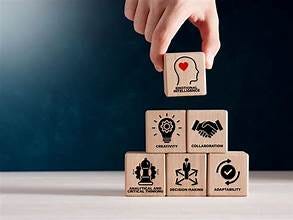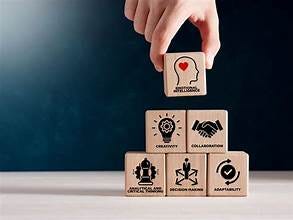On a partly cloudy day in 1995, a young science journalist named Daniel Goleman sat at his small desk, faced with a pile of notes. Little did he know that his book Emotional Intelligence would become a global phenomenon.
Goleman did not invent the concept out of thin air—two researchers, John Mayer and Peter Salovey, had preceded him in university labs—but he gave the idea a new life: a popular one.
Since Daniel Goleman published his famous book Emotional Intelligence, academic and professional circles have undergone radical shifts in their understanding of the factors influencing personal and organizational success. Intellectual intelligence (IQ) is no longer seen as the sole marker of excellence; instead, emotional intelligence (EQ) has taken center stage in evaluating leadership performance, developing personal skills, and managing social relationships.
However, the path the concept has taken since its initial formulation by John Mayer and Peter Salovey in the late 1980s has been the subject of ongoing debate. While early research stemmed from a scientific hypothesis to study how emotions are perceived, regulated, and utilized, the concept later evolved into a widely marketed product, incorporated into corporate training programs and touted as a golden key to success in work and life.
Within a few years, emotional intelligence (EQ) became a buzzword in training halls, job interviews, education, and the speeches of leaders and coaches. Everyone began talking about the importance of understanding one’s emotions, managing anger, and empathizing with others—as if the world had finally discovered a secret recipe for success.
Whether emotional intelligence is an exact science or not, its social and psychological impact has become an undeniable reality. Perhaps its practical value today lies not in its "measurement" but in its use as a bridge to understanding oneself and others—albeit with varying degrees of accuracy and sincerity. The question remains open: Do we need more emotional intelligence... or a deeper critical awareness of how and why we use it?
Amid this widespread popularity, other voices began to rise in less conspicuous corners. Traditional psychologists warned:
"Not all that glitters is gold!"
Behind the Glitter: Scientific and Methodological Criticisms
Despite its growing popularity, emotional intelligence has not escaped academic criticism:
A vague and ambiguous concept: Researchers like Joseph Fornham argue that definitions of emotional intelligence are so broad that they make it difficult to distinguish from general positive social behavior.
Not intelligence in the traditional sense: Unlike intellectual intelligence (IQ), which is measured through standardized tests, emotional intelligence is difficult to assess with scientific precision, making it closer to a personality trait like empathy or self-control.
Driven more by market considerations than science: Emotional intelligence has been accused of being heavily promoted by the self-help and coaching industries, distorting the concept from its original research roots. Criticism has gone so far as to label it more of a marketing product than a scientific discovery.
Conceptual overlap: Critics point out the similarities between emotional intelligence and other concepts like social intelligence and psychological resilience, which muddle attempts to define it clearly. What, then, does emotional intelligence truly offer that is new?
John Mayer, one of the founding fathers of the concept, expressed his concern, saying:
"What is being sold today under the banner of emotional intelligence has strayed far from what we originally sought to explain scientifically."
Classifications of Intelligence: Where Does Emotional Intelligence Fit?
To understand emotional intelligence’s place among different human abilities, intelligence can be divided into four basic categories:
Intellectual Intelligence (IQ): The ability for logical analysis and solving mathematical and cognitive problems, typically measured through standardized tests like the Stanford-Binet scale.
Emotional Intelligence (EQ): The ability to understand oneself, manage emotions, and build healthy relationships based on emotional awareness.
Social Intelligence (SQ): The skill of building successful social networks and managing relationships within accepted societal norms.
Adversity Quotient (AQ): An individual’s resilience in facing challenges and psychological pressures, continuing to progress despite crises.
In the Arab world, while these classifications may not be explicitly stated, they often implicitly shape how individuals are assessed:
One person may value your ability to overcome hardships (AQ), another may judge you based on your social relationships (SQ), while a third might evaluate you according to academic grades (IQ).
Emotional Intelligence and Ideology
Later, emotional intelligence found its way into platforms beyond training halls. In religious sermons or social discussions, it became a soft tool to promote messages of tolerance, kindness, and self-control. On the surface, this seemed commendable. But beneath, questions arose: Is this scientific concept being reshaped to fit pre-existing ideological molds?
The Story Continues: Between Caution and Enthusiasm
Despite all the controversy, emotional intelligence remains an enticing idea: Who wouldn’t want to understand themselves and others more deeply?
In the end, whether we consider emotional intelligence a genuine revolution or a passing trend, its story is fascinating: the tale of a scientific concept that emerged from cognitive psychology labs, only to find itself in business arenas, school classrooms, Friday sermons, and self-development workshops.
It is a vivid reminder that ideas, like people, do not exist in isolation from context. They change, evolve, and sometimes... are misinterpreted.
Yet, amid all this glitter, perhaps we should ask a simple question:
In the age of digital transformation, is it time to redefine emotional intelligence with stricter measures? Or is its flexibility and universality precisely what makes it invaluable in an era of speed and complexity?




